Got a degree under your belt? Before the pandemic, the majority of graduates planned to enter the workforce shortly after graduating. Needless to say, the pandemic has taken its toll on a number of sectors and changed the world of work. Has this caused students to rethink their plans? The Fachkraft 2030 survey has cast a light on the current situation for students at the end of their studies.
Cologne, 17 November 2020. How do prospective graduates feel about the future? What do they value when entering the workforce? Traditional aspects such as salary and career opportunities have been joined by COVID-19 factors that need to be accounted for when entering the workforce. Even if the announced vaccine puts us on the path to a return to normal life, the pandemic has already wreaked havoc on the labour market. In the 17th nationwide Fachkraft 2030 survey, we looked at the role the pandemic has played on the choice of degree, target industries and other aspects. We partnered with Maastricht University to survey 13,000 students from all age groups and disciplines.
Kickstarting a career: Has the pandemic influenced which degree students want to attain?
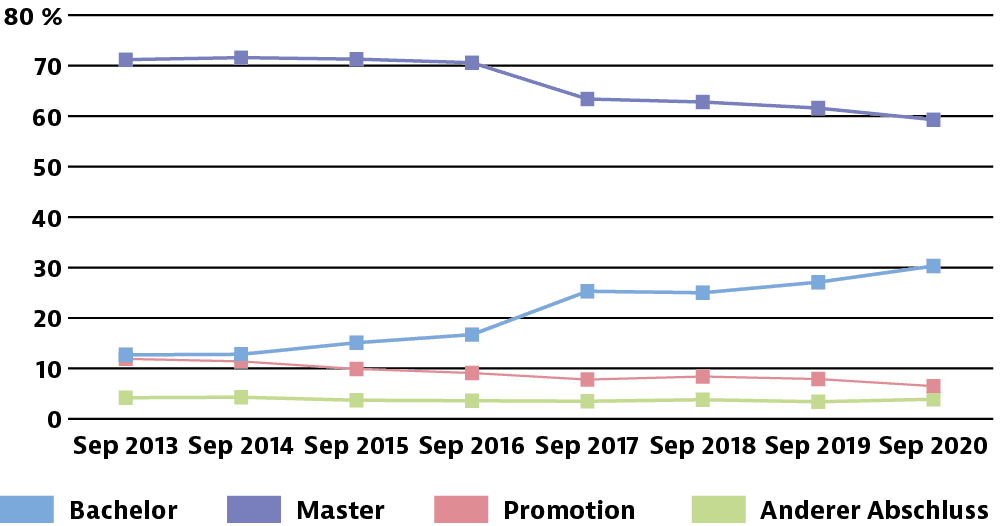
Bachelor's degrees are highly sought after and an increasing number of students aren’t continuing their studies after graduating with a bachelor's, despite the allure of higher salaries and better career prospects offered by master's degrees and PhDs. As it currently stands, just over 30 percent of students now want to leave university with the lowest professional qualification. Less than 60 percent want to go on to study for a master’s degree, and only 6.5 percent want to do a PhD. In this respect, the current survey mirrors the trend in recent years. In 2013, 71.2 percent of respondents wanted to attain a master’s degree and 12.7 percent a PhD. Consequently, it cannot be said that the pandemic has led to an increased tendency to pursue further or higher study.
The fundamental question: Do students still want to kickstart their careers right after graduation?
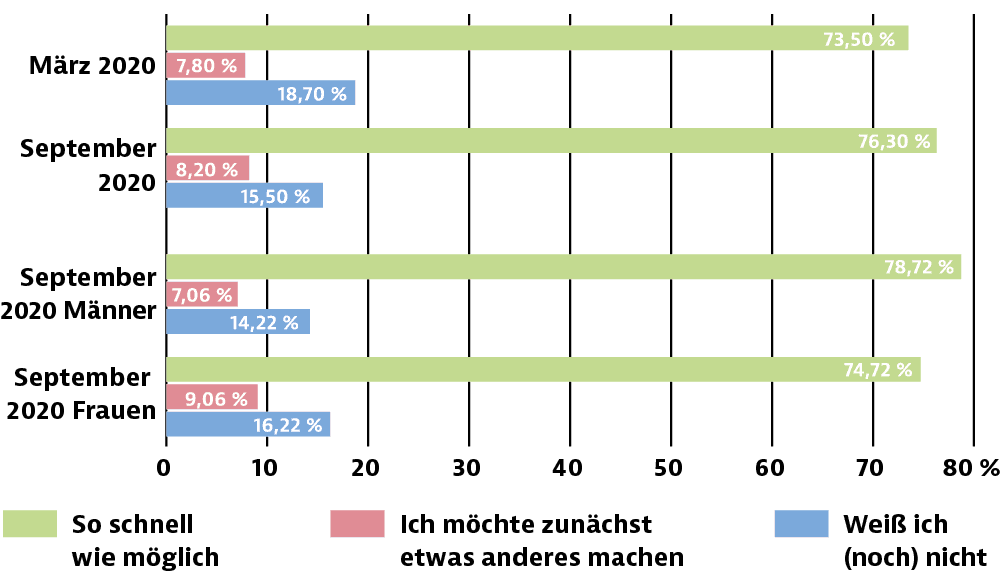
The situation in 2020 has made it practically impossible to spend time abroad or travel. It therefore doesn’t come as any real surprise that 76.3 percent of those surveyed in September aim to enter the workforce ‘as soon as possible’ after graduation. In March, this value was 3 percentage points lower. On the flipside, the 8 percent of respondents who want to delay starting their careers came across as stoic. Over three quarters (76.7%) view no ‘significant’ link between their plans for the future and the pandemic. Almost half (46.1%) would like to enjoy 6 to 12 months of time off after finishing their studies, with just under a quarter (24.1%) reporting they’d be happy with a maximum of 24 weeks. 15.6 percent want to take a year or more, whereas the remaining 14 percent are still undecided. Generally speaking, it would appear that most students aspire to start work soon after graduation, with a slight increase in terms of percent. That’s not to say a major trend has emerged as a result. The impact of the pandemic on those who want to take some time off after graduation appears to be minimal.
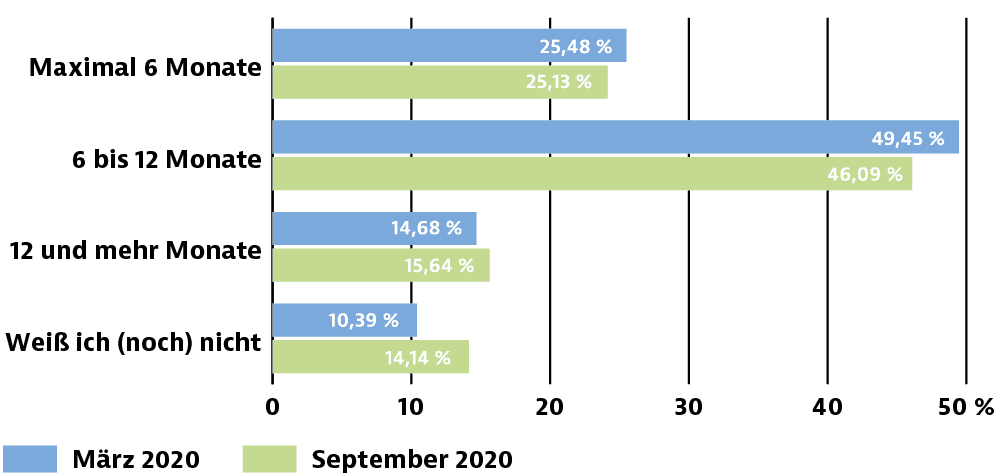
Which sectors are particularly attractive for fresh graduates in times of COVID-19?
The pandemic has had a notable impact on public perception of the healthcare and teaching industries. Headlines in the past year have cast a spotlight on shortcomings in care and education. In light of the systemic relevance of these fields and the ageing population, this is certainly cause for concern. Compared to other areas, these sectors are losing their appeal. In contrast to the survey conducted in March, health, care and social work have sunk in popularity from 11.2 to 9.1 percent, with education, training and research going from 14.1 to 12.5 percent. In this case, the pandemic may potentially be responsible for the waning popularity of occupational fields that have long been associated with stress and contact with a large number of people. That being said, the percentage of students interested in these fields remains comparatively high.
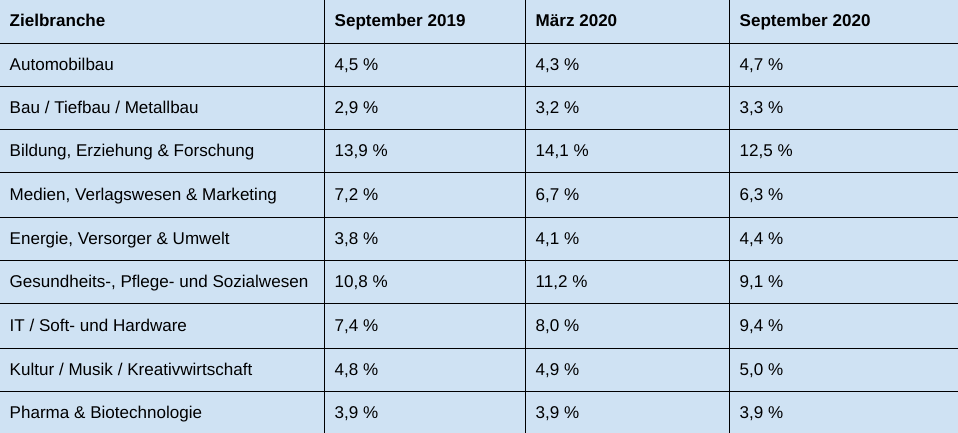
Amplified impact on new students
While the numbers may not have changed drastically for students further on in their education, concerning disparity has been observed among beginning students, i.e. students up to their second semester, who are more easily able to change their plans and switch their degree programme. These respondents have completed a major part, or even their entire degree, during the pandemic. Significantly lower numbers want to work in health, care and social work compared to September 2019 – with a 28 percent decrease; 19 percent of all respondents. A similar trend has been observed for education, training and research, which is down 31 percent (across all respondents: only 11 percent). Perhaps one indication that many prospective graduates view the pandemic as a short-term hindrance comes with the percentage of respondents who reported that their aspiration to work in culture, music and the cultural economy remains unchanged. The sector is one of the hardest hit by the pandemic and has received state aid since March.
More than just salary and opportunities to climb the career ladder: What matters to students?
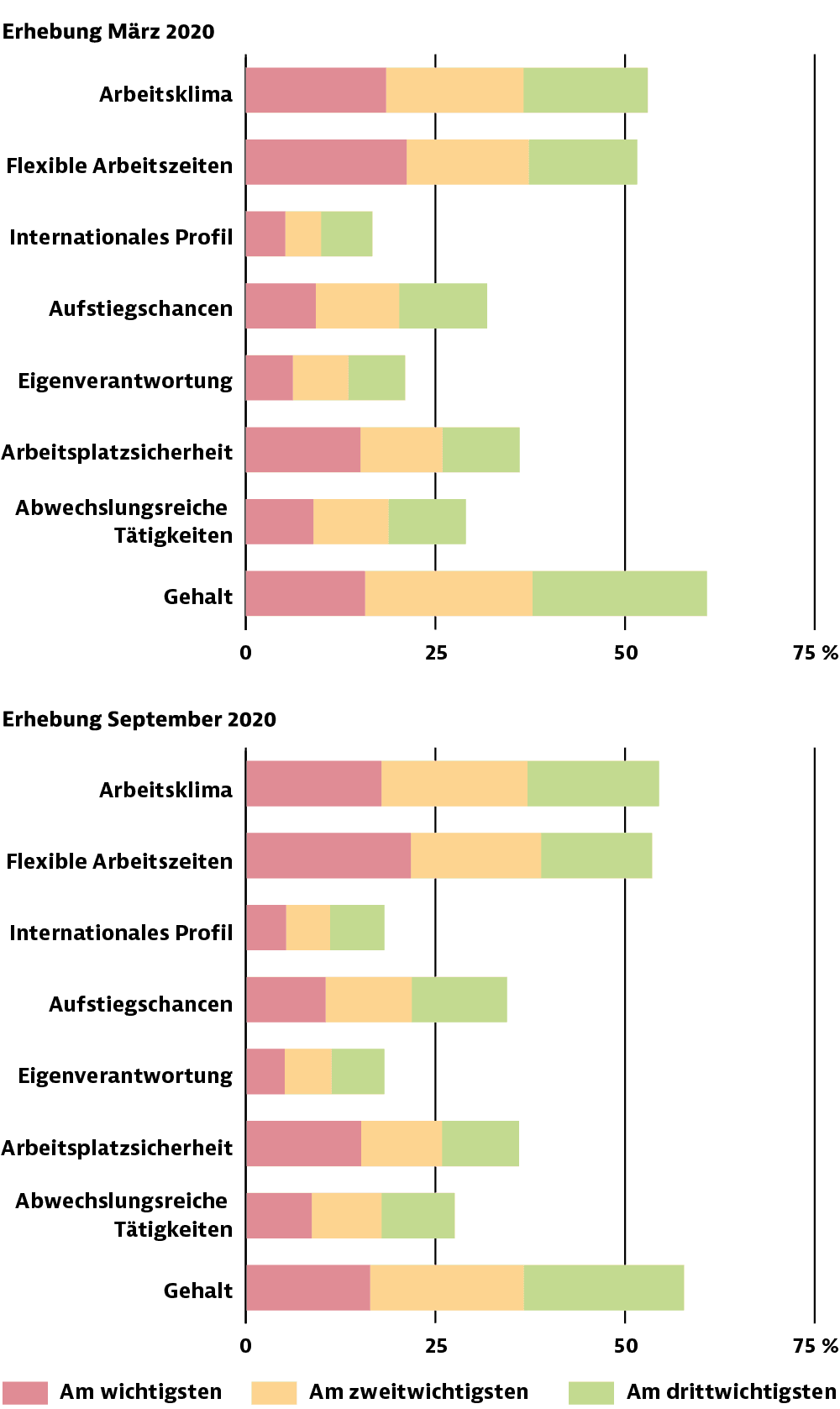
Many employees highly value flexible working hours to attain a balance between work, free time and family. The Federal Ministry for Economic Affairs and Climate Action took an in-depth look at this topic in a publication released in 2013. Accordingly, flexible working hours are just as important as salary and prospects to students. The largest percentage, 21.7 percent of respondents, found flexibility to be the ‘most important’ aspect, placing it in first place. Working atmosphere came second (17.8%), followed by salary (16.3%) and job security (15.1%), ahead of prospects. The situation has remained largely unchanged since March 2020. It remains to be seen whether these attitudes will prevail into the future, or whether a shift will occur.
Remote or at the office – what do prospective graduates look for in a job?

Students are currently given the freedom – or are forced, depending on your take – to be flexible. Has this resulted in a rise in the number of those who want to work from home as is currently common practice? The findings were rather surprising: Around 75 percent would prefer to work in the office, with only 13 percent indicating a preference for working from home. Just under 12 percent of respondents are in favour of working from anywhere. While many experts assume that a certain amount of working from home will remain, going into the office would appear to be the preferred approach among the student workforce of the future. The percentage of respondents in favour of dedicated desks was largely the same as the number in favour of doing away with hot desks at the office (38.2% compared to 36.9%). In this sense, the pandemic has barely swayed opinion among students. Nevertheless, only hot desking has risen in popularity, with a 10 percent increase in popularity compared to 2018. It remains to be seen whether this reflects a desire for cooperative working models or instead solely reflects the will to return to normality.
Remote mathematicians vs on-site sports scientists
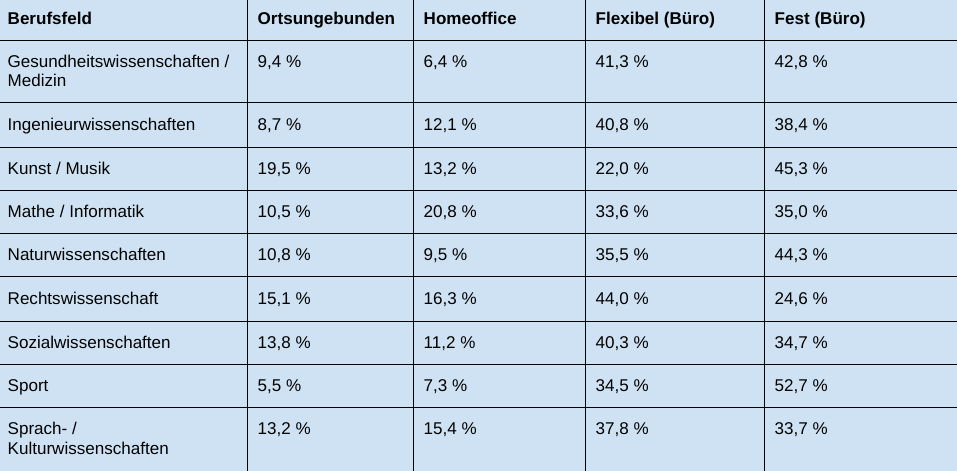
Each discipline has its own view towards working from anywhere, particularly in art and music, where 19.5 percent of students responded with a desire to work independent of location. Students of mathematics and computer science demonstrated a preference for working from home (20.8%). A flexible workplace is especially valued by law students (44.0%), whereas 52.7% of sports scientists prefer a fixed workplace (i.e. working on site). Of course, this can often be attributed to the various job profiles and practicability. It’s safe to say that prospective graduates have a clear picture in of their future careers and want to act accordingly.
Gauging views towards entering the workforce: Has the pandemic led to more pessimism?

The COVID-19 pandemic has spurred widespread turbulence, not just in the sectors mentioned above, such as health, education and culture. The number of people subjected to short time work rose sharply over the course of the year. Nevertheless, the majority of all respondents expect their careers to start unhindered. Around 65.5 percent anticipate making a smooth transition into the workforce ‘directly after graduation’. In a rough comparison between genders, men are somewhat more confident about starting their careers directly after graduation, at 67.3 percent. Only 64.4 percent of women share this optimism.
Prospective female graduates more pessimistic
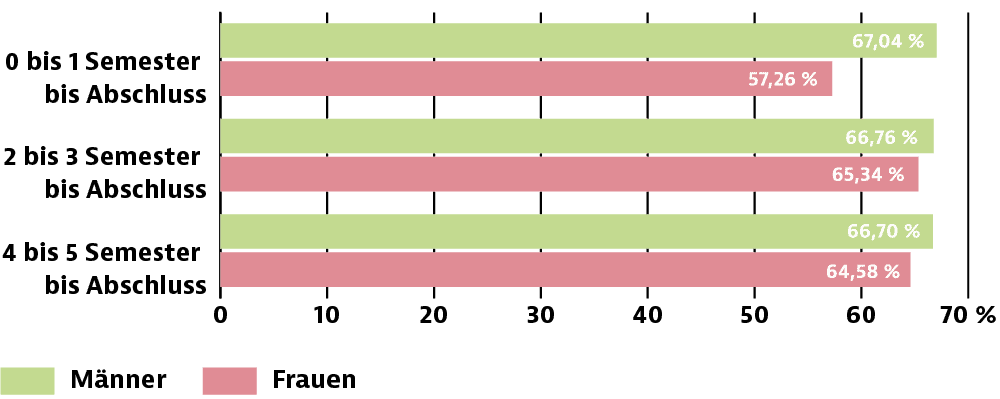
The picture looks a little different when looking at differences between the genders among students who are just about to graduate from the highest education level they hope to attain. Similarly to above, 67.0 percent of male respondents don’t expect to face any major hurdles in starting work after graduation, whereas only 57.3 percent of female respondents shared this enthusiasm. Whether this pessimism can be regarded as a temporary outlier or will prevail into the future will become clearer in subsequent studies. The same applies to views towards future careers in general.
Long-term prospects found to be good
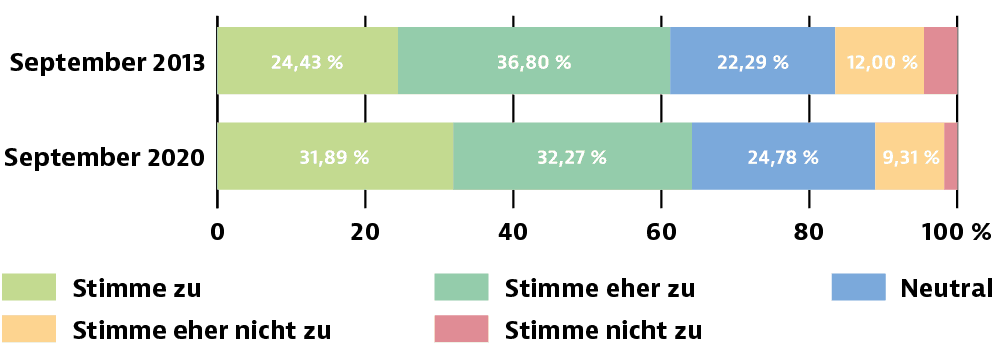
Time for some good news: At the moment, students are highly optimistic. Around 64 percent regard their job opportunities after graduation as ‘good’ and responded accordingly; more than half of respondents without reservation. On the other side of the coin, only 11 percent of participants are sceptical about their future job prospects. Around 25 percent of students claimed to be impartial on the matter. Compared to the Fachkraft study conducted in September 2013, student opinion on future job prospects remains largely unchanged and has even improved with regard to the long-term outlook. A somewhat unexpected outcome in light of the 2020 pandemic, which is certainly cause for celebration.
jobvalley summary
Confidence is key in challenging times, not least in the professional world. The risk of placing an extra burden on mental health was highlighted early in the pandemic. It’s therefore all the more reassuring to hear that the majority of prospective graduates continue to stride on with optimism. As a consequence, the economy will be able to rely on the availability of well-educated and motivated graduates when things are on the up. The fact that these graduates increasingly elect to solely attain a Bachelor's degree should not detract from this, as this qualification is gaining rising recognition among companies.
Instead of focusing on job requirements, it would perhaps be more conducive to focus on and counter the waning popularity of the health, care, social services and education sectors, a topic which is also covered in the latest jobvalley whitepaper. Hopefully this issue can soon be addressed with practical insights, when the situation permits. Most importantly, the state needs to work to improve working conditions. The next Fachkraft Survey will follow up on these developments.


